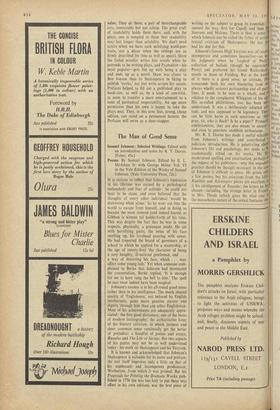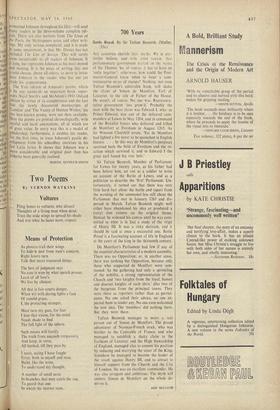The Man of Good Sense
Samuel Johnson: Selected Writings. Edited with an introduction and notes by R. T. Davies. (Faber, 45s.)
Poems. By Samuel Johnson. Edited by E. L. McAdam Jr. with George Milne. Vol. VI in the Yale Edition of the Works of Samuel Johnson. (Yale University Press, 72s.)
IT is curious to reflect that Johnson's reputation in his lifetime was earned by a pathological melancholy and fear of solitude: he could not bear to be alone, and even believed that the thoughts of every other individual 'would be distressing when alone.' So he went out into the world to escape from himself, and in doing so became the most revered (and indeed feared, as Gibbon is witness to) holder-forth of his time. This was despite the fact that he was in some respects, physically, a grotesque misfit. He ate with horrifying gusto, the veins of his face swelling up, his forehead pouring with sweat. He had (reported the board of governors of a school to which he applied for a mastership, at the age of twenty-five) 'the character of being a very haughty, ill-natured gentleman, and . . . a way of distorting his face, which . . . may affect some young lads.' Yet when someone com- plained to Burke that Johnson had dominated the conversation, Burke replied, 'It is enough for me to have rung the bell to him.' The spell he cast must indeed have been magical.
Johnson's essence is in his all-round good sense rather than in his intelligence. The much abused quality of 'Englishness,' not beloved by English intellectuals, gains more genuine stature and dignity through him than any other Englishman. Most of his achievements are adequately appre- ciated: the first good dictionary, one of the bases of modern lexicography; the authoritative force of his literary criticism, in which justness and sheer common sense continually get the better of prejudice; a handful of poems and essays, Rasselas and The Life of Savage. But two aspects of his genius may not be so well understood today : his work on Shakespeare and his Toryism.
It is known and acknowledged that Johnson's Shakespeare is valuable for its notes and preface; the text itself improves only a little on that of his unpleasant and incompetent predecessor, Warburton, from which it was printed. But his Proposals for Printing the Dramatic Works, pub- lished in 1756 (he was too lazy to put these into effect in his own edition), was the first piece of writing on the subject to grasp its essentials: opened the way, first for Capell, and then Steevens and Malone. There is thus a sense which Johnson can be called the father of serf
d textual criticism of Shakespeare. He has had his due for this.
Johnson's famous High Toryism was. of cou intemperate and sometimes insensitive—as
his judgment when he laughed at Percy' collection of ballads (though he appreciate: Percy) and preferred his friend Richardson novels to those of Fielding. But at the kerns of it there is a good sense, an attitude, tta, transcends both his own blustering (and 110 always wholly serious) partisanship and all part) lines. It needs to be seen as a whole, and It relation to the complacent Whiggism of his age His so-called philistinism, too, has been ne): • understood. It was a deliberately adopted alit. tude, and was supposed to be legendary. Ther can be little harm in such questions as 'Ant pray, sir, who is Bach? Is he a piper?' Primarily exhibitionistic, they are also meant to amuse" and even to puncture snobbish enthusiasm.
Mr. R. T. Davies has made a useful selection from Johnson's writings and contributed judicious introduction. He is penetrating aboVt Johnson's tife and psychology, but tends to he, academically stilted on his works. He h3s modernised spelling and punctuation, perhaps al the request of his publishers -why this impudent practice should be thought necessary in the cat of Johnson is difficult to guess. He prints oh a few poems, but his selections from the Idle" Rambler and Adventurer pieces are excellent, as is his abridgement of Rasselas; the letters he Ns, chosen—including 'the strange letter in French to Mrs. Thrale (which gives the vital clue I° the masochistic nature of the sexual fantasies that tormented Johnson throughout.his life)—will send many readers to the three-volume complete edi- tion. There are also sections from The Lives of the Poets, the Shakespeare notes and other writ- mgs. My only serious complaint, and it is made in some amazement, is that Mr. Davies has not Included The Life of Savage. This will surely '.eeM inexplicable to all readers of Johnson. It I: long, but represents Johnson at his most moved and moving. It is the piece of writing that one would choose, above all others, to serve to intro- duce Johnson to the reader who has not yet made his acquaintance.
The Yale edition of Johnson's poems, which is by any standards an important book, super- sedes Nicol Smith's and McAdam's 1941 Oxford edition by virtue of its completeness and the fact that the newly discovered manuscripts of London' and 'The Vanity of Human Wishes,' his two best-known poems, were not then available. Here the poems are printed chronologically, with careful and lucid annotations, all of which are of great value. In every way this is a model of scholarship; furthermore, it enables the reader, [or the first time, to trace Johnson's poetic de- velopment from his schoolboy exertises to his last Latin lyrics. It shows that Johnson was a more considerable and original poet than has hitherto been generally realised.
MARTIN SE.YMOUR-SMITH



































 Previous page
Previous page